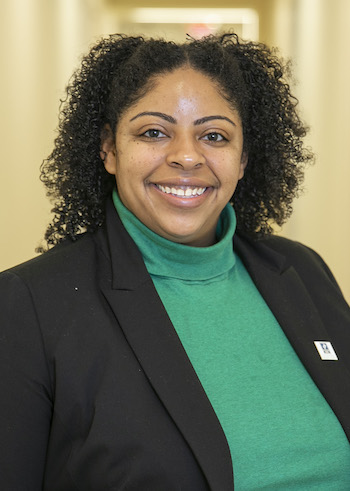In This Story

George Mason University’s Alison Cuellar and Leah Adams have received a $54,918 grant from the National Institute for Health Care Management (NIHCM) Foundation for their study on health equity and the impact of Medicaid telehealth policy.
“NIHCM looks for projects with high potential to inform improvements to the U.S. health care system, so we are honored to be included [among the 38 grantees]," said Cuellar, a professor of health administration and policy in the College of Health and Human Services.
Adams, assistant professor in the Department of Psychology and the Women and Gender Studies Program in the College of Humanities and Social Sciences, said they plan to focus on two studies evaluating the degree to which and how expanding telehealth services can improve health equity across a diverse set of populations within Virginia.
The quantitative study focuses on Medicaid claims data and the qualitative study focuses on barriers, facilitators, special concerns, and overall effectiveness of providing services via telehealth, they said.
For this qualitative component, Adams said they plan to seek the perspectives of a range of stakeholders including health care providers, patients, and advocacy organizations. She hopes this collaborative approach, which will draw on expertise from multiple fields, is a good example of how issues critical to public health can be addressed.
Access to health care is an issue that contributes to health disparities in Black, Latino, and low-income populations. “We hope to explore concrete steps that agencies and policy-makers can take to reduce and eliminate disparities in care,” said Adams.

The findings of the study are expected to inform deliberations of federal and state policymakers as they consider whether and how to extend the more liberal telehealth policies and to identify remaining policy gaps—particularly among marginalized/minoritized communities.
“I was drawn to the chance to examine this big policy issue from a variety of stakeholders' perspectives to see where there is synergy for creating positive change,” said Adams.
“Policymakers across the country are trying to figure out how to support telehealth and retain high quality care at the same time,” said Cuellar. “For our study, we want to look at these issues through a health equity lens.”
Adams said they’re lucky to have students involved at multiple levels, including Constance Owens, a doctoral student in health services research, and several undergraduates through the Office of Student Scholarship, Creative Activities, and Research (OSCAR).
“Our study includes data analysis and interviews with key stakeholders, so we recently added a few students onto our team to help with our interviews with clinicians, consumers, and others,” Cuellar said.
This is a one-year research project, with preliminary results expected by January 2023.
